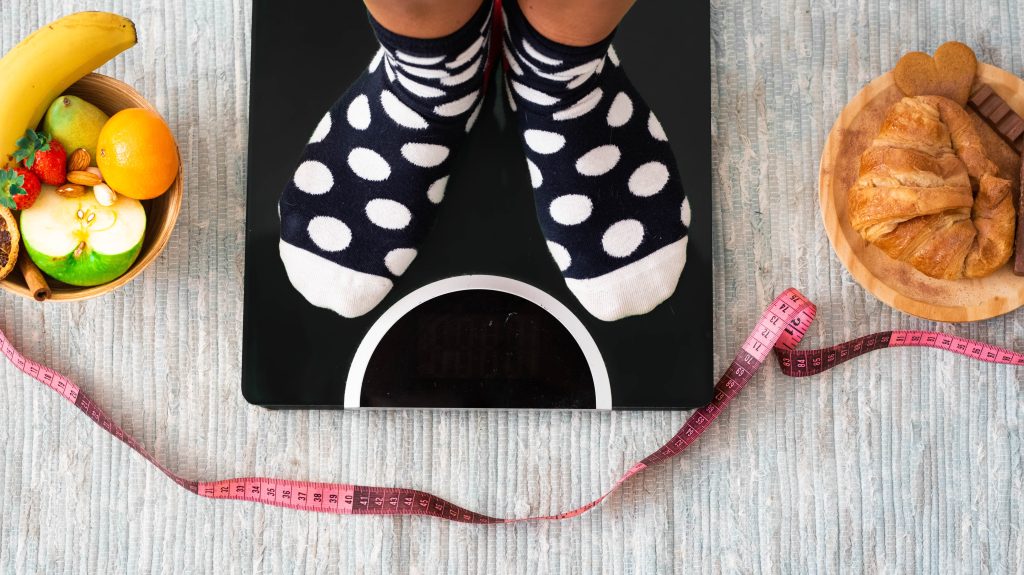Kurzfristig ein paar Kilo zu verlieren geht meist vergleichsweise einfach und schnell. However, maintaining the new weight in the long term is the real challenge for many people. Most often, it doesn’t work because the transformation is viewed as a limited period. In a meaningful way, long-term, healthy weight loss can only work if you question and adapt your lifestyle. This can be approached either radically or step by step, and it depends on the individual’s preference. In my opinion, it is important in this regard not only to think about the goal but also to make the journey as enjoyable as possible.
To reduce overweight in a healthy and sustainable way, I build my customer support on the following four pillars: nutrition, strength training, endurance training, and mental training.

Most people know what a healthy diet should look like. However, it often fails in the implementation. The general recommendations such as “less sweets, less alcohol, fewer snacks” are generally correct but may not be sufficient on their own. In my opinion, nutritional training should be tailored to the individual and provide alternatives.
At the beginning, it is advisable to become aware of one’s own eating habits. That’s why I recommend keeping a food diary for at least 2 weeks. Take 2 typical weeks from your everyday life (not during vacation).
In addition to the food and drinks, it is also important to note how you felt at the moment of consuming the food. Many overweight individuals are emotional eaters, and in these cases, it is important to explore the triggers. It is also important to note which foods make you feel good and which ones have less positive effects.
This first step brings a lot of clarity, both to eating habits and emotions, and based on that, much better recommendations can be developed. Keeping a food diary requires a small effort. Approximately 10 minutes per day for two weeks is a very good investment of time in your own health.

Strength training is crucial for healthy and long-term weight loss because your muscles burn more calories even at rest (for example, while sleeping) compared to fat tissue.
Strength training helps counteract age-related muscle loss. Furthermore, strength training helps improve insulin action. Enough reasons to start training today if you haven’t already.
You don’t necessarily have to train in a gym if you don’t want to. There are plenty of exercises you can do at home using your own body weight. If you are healthy and have no pain, it’s best to focus on training the large muscle groups (e.g., legs, buttocks, back, major chest muscle) at the beginning, as they burn the most calories. A good trainer conducts an initial anamnesis conversation with you, listens carefully, and adapts the exercises to you, your needs, and your goals.

The calorie expenditure during endurance training varies depending on the type of sport. Basically, the rule is: The more muscles involved, the higher the energy consumption. Apart from weight reduction, cardio training helps improve respiratory depth, blood circulation, and fat metabolism, to name just a few benefits.
Depending on your current overweight, you should choose the type of training. Also, the fun factor should not be neglected. Choose a sport that brings you joy, as this is the key to sticking with your program in the long run.
If you have physical issues, consult with your doctor to determine which sports are suitable for you. If you experience pain, it’s best to start training with a physiotherapist. If you are pain-free, ideally have an experienced trainer create a suitable program that fits well with you and your lifestyle.
Also, remember to incorporate as much movement into your daily life as possible. I know, this advice is often mentioned. But do you implement it?

This point is unfortunately often neglected but is a prerequisite for successfully integrating the other three points and thus making a long-term change to your life. Mental training contributes immensely to your well-being and the success of your endeavor. If the reasons for your overweight, for example, are related to stress, it is crucial to closely examine your current lifestyle and concurrently work on stress reduction. The reasons for overweight often go much deeper than expected.
It is also important to keep your main goal in focus but not to forget the important, small intermediate goals. Setting realistic, motivating goals is the basic prerequisite for successful weight loss.
It’s also best to develop strategies at the beginning on how to stay on track during challenging times to reach your goal. Reducing overweight is a long journey with many highs and also some lows. Being well-prepared for this helps to not give up and implement your plan to stay healthy in the long run.
You can find more training and nutrition tips on my website www.purebody.at.
Much joy and success in implementing your plan!
Yours Verena
pure body e.U.
Mag. Verena Ullmann
Akad. Body Vitaltrainer
Dipl. Nutrition coach
Dipl. Mental trainer
Personal Trainer
Running coach


